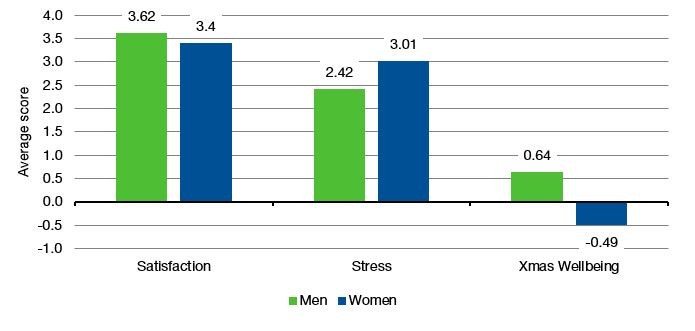Christmas is upon us and this post will be my last for this year. Over the next couple of weeks, I will try to keep my weight gain below the national average (which in Germany is about 0.8% of your body weight, according to this study) and work on some projects for next year. The next post will be published on 3 January 2022.
But before I go on hiatus, let me tell you how to be happy over Christmas. In my experience, Christmas can be quite stressful, but a few simple, scientifically proven rules will help you get through the holidays happy and merry.
There are plenty of studies that investigate what makes us happy and I have summarised the key results of this happiness research on a previous occasion. But Tim Kasser and Kennon Sheldon have focused particularly on Christmas. The main results are shown below and the good news is that on average about 3 out of 4 people report feelings of satisfaction on Christmas and only about half of all people report feelings of stress.
Average mood on Christmas
Source: Kasser and Sheldon (2002)
Dig deeper, however, and you see that women are significantly more stressed on Christmas than men and that overall Christmas wellbeing (which is the average of satisfaction and ten other positive moods minus the average of stress and ten other negative moods) is positive for men but negative for women. Could it be that women are more stressed on Christmas because traditionally, they had to cook the meals, organise the presents and deal with the children while the men “helped” where needed? Thus, my first recommendation is to share responsibilities to reduce stress on individual members of the household.
Meanwhile, if you still don’t enjoy Christmas, let me tell you that it gets better with age. Older people generally report a lower level of stress and negative moods on Christmas which improves overall Christmas wellbeing. But apart from waiting a couple of decades, you can improve your Christmas wellbeing with three additional measures (sorted in order of declining impact):
Spend less: Giving and receiving presents is generally a source of frustration because it creates stress for the giver (who has to think of something nice to give and go and buy it) and disappointment for the receiver (who often doesn’t get what they really wished for). The more costly presents are, the bigger this frustration for both the giver and receiver of presents. The consumerist part of Christmas is what makes people unhappy, so reduce that to a minimum, if you can.
Spend time with family: Happiness research shows unequivocally that spending time with family and friends is what makes us happy. Christmas is no exception despite all the stories of drunk in-laws and fights over dinner.
Practice religion: Religious people generally are happier than non-religious people. Religion provides a sense of belonging and community so if you are religious, go to church or spend time with your community of faith. It will make you happier. Of course, there is no point in going to church when you are an atheist or don’t like religious practices. That’s only going to make you more miserable.
Finally, and that may be the best tip of them all: Be careful. Christmas and New Year is the deadliest time of the year. David Phillips and his colleagues examined deaths of natural causes in the United States and showed that there are two distinct spikes in deaths in emergency departments of hospitals (ED) or cases where patients were pronounced dead on arrival (DOA).
Instances of natural causes of death in emergency departments (ED) and patients pronounced dead on arrival (DOA)
Source: Phillips et al. (2010).
The most common cause for the spike in deaths is substance abuse, i.e. people drinking too much or taking drugs, while heart attacks and strokes also increase during the holidays. Deaths from cancer and diseases of the respiratory and digestive systems also increase during Christmas and New Year but this is likely due to the fact that many terminally ill patients prefer to spend their last Christmas at home rather than in a hospital.
So look after yourself, stay safe and spend some time with your loved ones. And then we can all meet again next year.






"Of course, there is no point in going to church when you are an atheist or don’t like religious practices. That’s only going to make you more miserable."
This year I purchased and read a slim volume titled Mistakes Every Investor Makes (And How To Avoid Them). Since you're an investor, you may have a copy on your shelf and could turn to chapter five which discusses the importance of not ignoring the other side of the story. The writer's insight applies to many more areas of life than just the financial markets.
Please don't accept the media's caricature of the atheist as an angry, bitter individual who holds religious people in contempt. It's not any fairer than the frequent depiction of religious people as, to use the medical term, nutjobs.
Religious people and atheists both have beliefs: God exists or gods don't exist. The religious person is reliably exposed to the other side of the story through world events and personal tragedy. Some change their belief as a result. World events and personal tragedy, on the other hand, reinforce the atheist's view (see section on confirmation bias in referenced chapter above).
Atheists (and agnostics and religious people) who desire more happiness would be wise to seek society with happy people. If the happy people are at a religious holiday service, then go join them. Guests are almost always welcome in houses of worship. At the very least, the music of the season can be very beautiful and, quite possibly, the atheist may begin to encounter the other side of the story.
Merry Christmas and enjoy your time away!